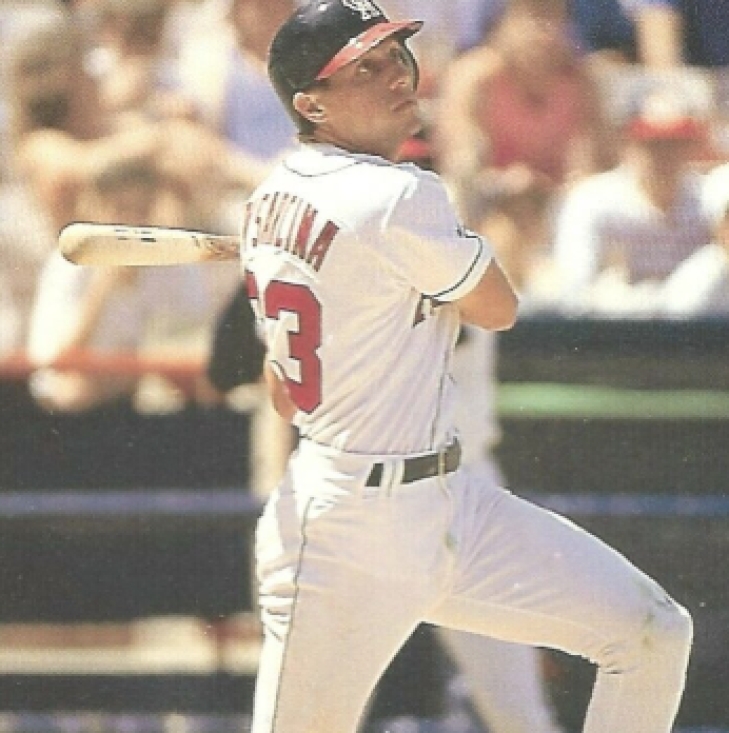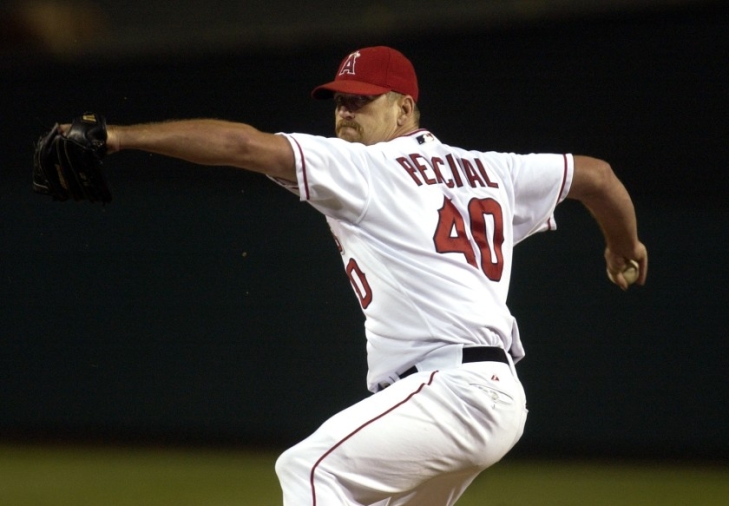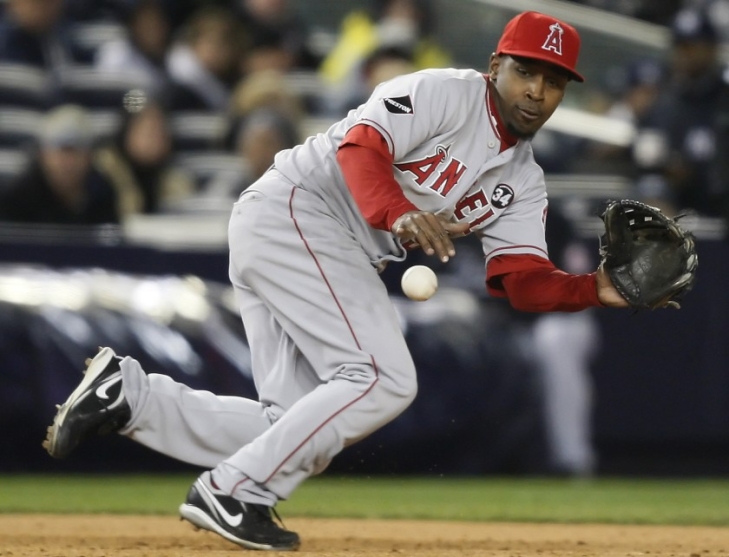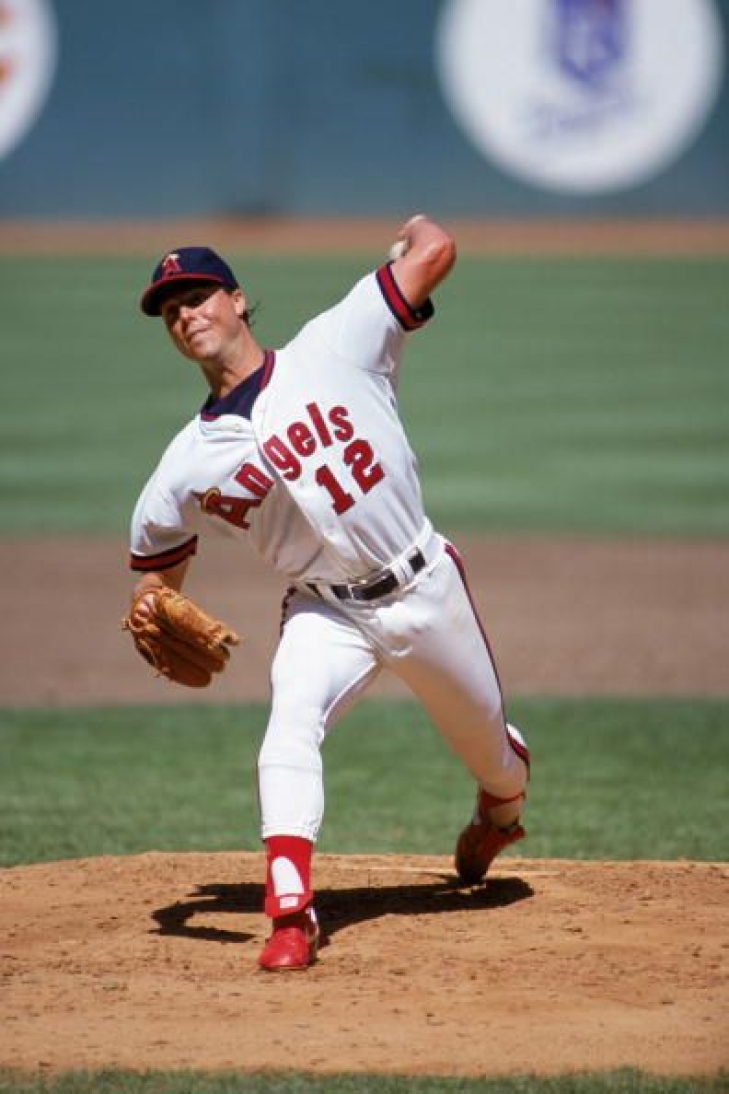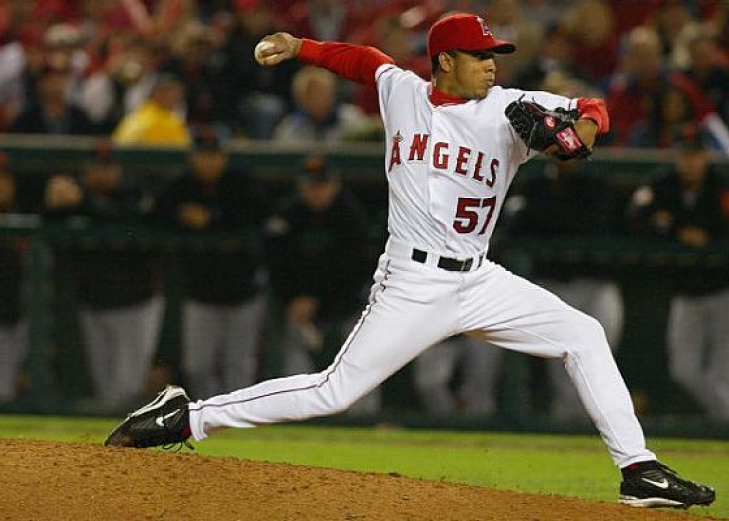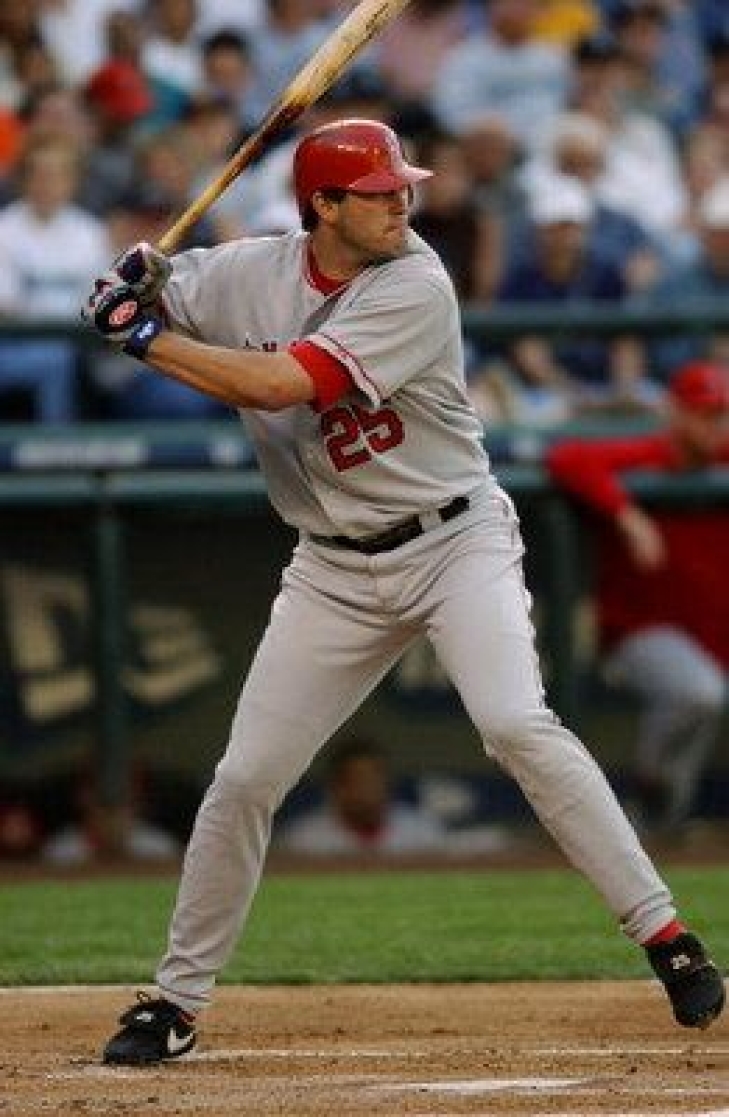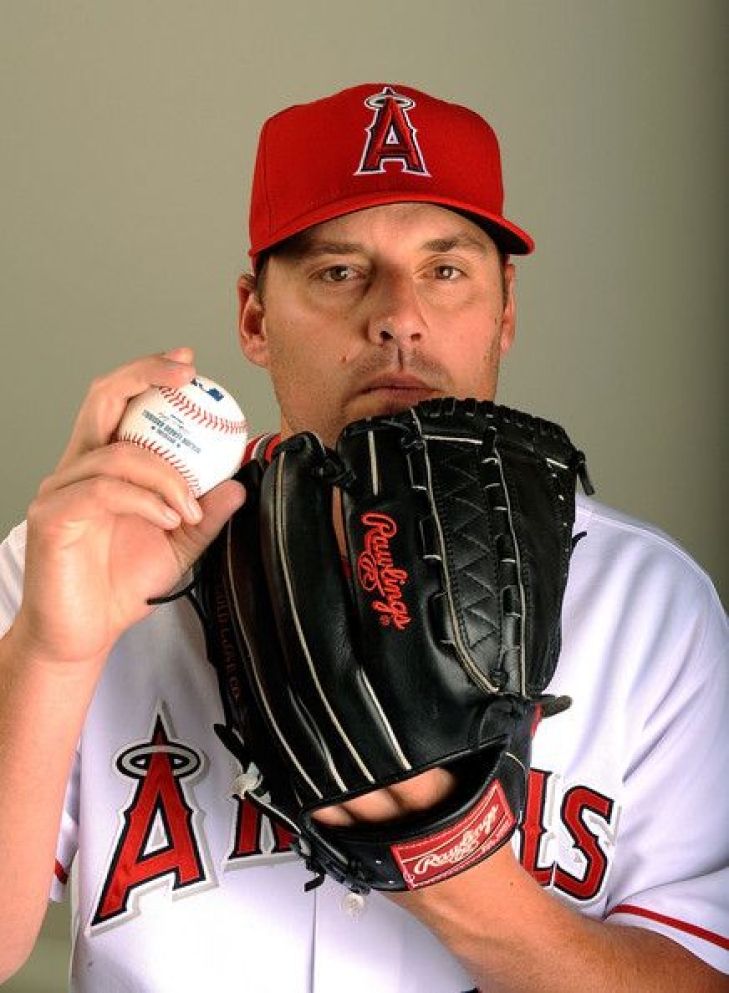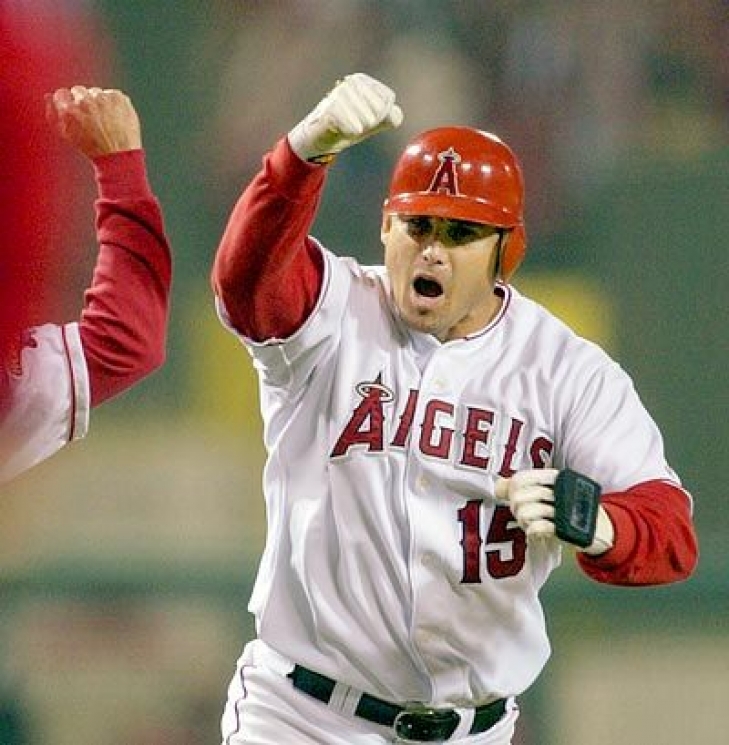49. Gary DiSarcina
Playing for the Angels his entire career for the Angels, Gary DiSarcina was not known for his natural ability, but for his leadership and dedicated play on and off the field.
Debuting for California in 1989, DiSarcina became the Angels primary Shortstop in 1992, and even represented the Halos in the 1995 All-Star Game. He was not a power hitter (he only had 28 career Home Runs), but did collect 966 Hits over his career that also provided solid defense.
19. Troy Percival
Troy Percival debuted in MLB with the California Angels in 1995, where he appeared in 62 Games in late relief, finishing 16 Games. Percival was fourth in Rookie of the Year voting, and it was a springboard to becoming the Angels’ closer in 1996.
Percival was the primary reliever for the Halos from '96 to 2004, going to four All-Star Games, and had at least 30 Saves in all of those years except for 1997. The Angels had put it all together in 2002, with Percival closing seven games in the playoffs.
With Francisco Rodriguez waiting in the wings, Percival left as a Free Agent for Detroit after the 2004 campaign. Percival recorded 316 of his 368 Saves with the Angels.
21. Chone Figgins
The Colorado Rockies drafted Chone Figgins, but before he made it to the Majors, he was traded to the Angels, which worked to his benefit.
Figgins made it to the bigs in 2002, playing a small role in the Angels' World Series Championship. Playing mainly at Third, Figgins was a regular starter in 2004, and through the rest of the decade, he was one of the top base-stealers in Baseball. Figgins swiped at least 30 bases annually from 2004 to 2009 for the Angels, including a league-leading 62 in 2005. He did not bring much power but did spray the ball often, collecting 1,045 Hits for the Halos, and was the league leader in Walks in 2009. Figgins was an All-Star that year, the only time he would be, which was his final season in Los Angeles, as he left for Seattle as a Free Agent at season's end.
14. Mark Langston
Mark Langston was Seattle's best Pitcher, but the Mariners were struggling, and they traded him in his contract year to the Montreal Expos (who sent them a young unknown named Randy Johnson) for their attempt to make the playoffs. The Expos plummeted (through no fault of Langston) and the flamethrower they rented left to return back to the West Coast, as he signed with the California Angels as a Free Agent in 1990.
Langston may not have had the same Strikeout numbers as a Mariner, but he still had a potent fastball. In his first season with the Angels, he was not great, but Langston rebounded in 1991, with a 19-8 and 3.00 ERA year that netted him his first All-Star Game appearance since 1987. He was sixth in Cy Young voting, and this was arguably his best season with California.
Langston was an All-Star again for the Angels in 1992 and 1993, and he was lauded for his defensive skills, winning five consecutive Gold Gloves (1991-95). He left the Angels for San Diego after the 1997 Season, and while wearing the Halo, he had a record of 88-74 with 1,112 Strikeouts.
12. Garret Anderson
One of the most tenured players in Angels history, Garret Anderson suited up for the franchise in 2,013 Games, which at present is a franchise record.
Anderson first appeared with the Halos in 1994, four years after he was drafted. Following that brief call-up, Anderson settled in at Leftfield, where he was one of the better and consistent offensive players at his position for the next ten years. His peak coincided with the Angels march to the World Series, which they won in 2002, with Anderson going to his first of three All-Star Games that year. He was also a Silver Slugger in 2002 and was fourth in MVP voting with 29 Home Runs, 123 RBIs, and a league-leading 56 Doubles.
From 2000 to 2003, Anderson had at least 28 Home Runs and 116 RBIs, with the last three years of that streak seeing a Batting Average over .300. Anderson played with Los Angeles until he signed with Atlanta as a Free Agent, and he accumulated 1,024 Runs, 1,292 RBIs, and 2,368 Hits, all of which are first all-time for the team. Anderson also hammered 272 Home Runs for the squad.
Had Anderson been more patient at the plate (.327 OBP) and not had some poor defensive years, he would have been ranked a few spots higher. Anderson might not have been a superstar, but they never had to think about the Leftfield spot for over a decade, which is a luxury for any Major League club.
The Angels inducted Anderson into their Hall of Fame in 2016.
13. Darin Erstad
In 1995, the California Angels made the number one pick Darin Erstad, a former Golden Spikes Finalist from Nebraska. Erstad debuted for the Angels the following season, and he was arguably the first building block that would see the team win it all in 2002.
Erstad would twice to go the All-Star Game (1998 & 2000), and in his latter All-Star year, the Outfielder had career highs in Batting Average (.355), Home Runs (25), RBIs (100), and led the American League in Hits (240). Erstad was a crucial part of Anaheim's 2002 World Series Championship, a three-time Gold Glove winner, collecting 25 Hits in that post-season.
Erstad remained with the Angels until 2007, and he had 1,505 Hits for the team with 114 Home Runs and 170 Stolen Bases.
17. Francisco Rodriguez
Dubbed "K-Rod," Francisco Rodriguez established himself as a top reliever when he was a rookie and barely one at that.
Rodriguez was called up in September of 2002, and due to injuries, he was given a vital role in the Angels' postseason, where he had 11 appearances, won five Games, and had a sub 1.000 WHIP in all three of Anaheim’s series. The Angels won the World Series, and it is hard to imagine this happening without Rodriguez.
Proving his performance was no fluke, Rodriguez was a set-up man in 2003 before moving to the closer's role in 2004. K-Rod was an All-Star in 2004 and would lead the American League in Saves in both 2005 & 2006. Rodriguez went back to the All-Star Game in 2007 and 2008, with the Venezuelan recording a then-record 62 Saves. He won the 2006 and 2008 Rolaids Reliever of the Year, and he finished in the top four in Cy Young voting three times. Rodriguez left the Halos after the 2008 Season for the New York Mets as a Free Agent.
As an Angel, Rodriguez compiled 208 Saves with a 2.35 ERA.
18. Troy Glaus
Troy Glaus was the power man of the Angels in the early 2000s, and his role in their 2002 World Series win should be forever celebrated in Southern California.
After he was chosen Third Overall in the 1998 Amateur Draft, Glaus made the Angels and was the regular Third Baseman as a sophomore, where he belted 29 Home Runs. Over the next few years, Glaus was the top power-hitting Third Baseman in the American League, winning the Home Run Title in 2000 (47) and posting an even 1.000 OPS. In 2000 and 2001, Glaus was both an All-Star and Silver Slugger, and although he was neither in 2002, it had to be the highlight year for Glaus in baseball.
2002 saw Glaus have 30 Home Runs (his third straight achieving that mark), but his post-season was pure electricity. Glaus hammered seven Home Runs in the playoffs, batting .300 in every series on route to the Angels' first World Series win. He won the World Series MVP and the Babe Ruth Award that year.
Over the next two years, Glaus missed a plethora of games but was still executing good power when he was playing. He left the Angels to sign with Arizona after the 2004 season, and he provided them with 182 Home Runs and the vital piece to their first title.
16. John Lackey
John Lackey’s Major League debut was in June of 2002 where he became a member of the Angels’ starting rotation. The timing could not have been better for Lackey, who was about to become part of a World Series Championship team. Lackey won a game in both the ALCS and World Series, and he entered 2003 as a permanent starter.
The hurler was up and down but always showed flashes of greatness and could eat a lot of innings. Lackey had his best season in baseball in 2007, where he went 19-9, led the American League in ERA (3.01) and ERA+ (150), and was third in Cy Young voting. He had two more decent years with the Angels before he signed with Boston as a Free Agent.
Lackey won two more World Series Rings, 2013 with Boston and 2016 with the Cubs. As an Angel, Lackey had 102 Wins against 71 Losses with 1,201 Strikeouts.
11. Vladimir Guerrero
If you were a fan of the Montreal Expos in the 90s and early 00s, you knew that if you had a star, they would eventually leave for greener pastures because your team could not afford to keep them. Such was the case for Vladimir Guerrero, who, after four All-Star appearances and 234 Home Runs as an Expo, joined the Halos in 2004.
You could say (and we are) that Guerrero saved his best performance for his debut campaign with the Angels. Guerrero captured the MVP on the strength of 39 Home Runs, 126 RBI, .337/.391/.598 performance and it ushered in a new four-year streak of All-Star Games. During that run, "Vlad the Impaler" never had led that 27 Home Runs, 108 RBIs, and a .317 Batting Average, and he was without a doubt one of the top offensive players in baseball.
Guerrero played with the Angels until 2009, signing with Texas and departing SoCal with 173 Home Runs and a Slash Line of .319/.381/.546. The Angels inducted Guerrero into their Hall of Fame in 2017.
2. Chuck Finley
Chuck Finley played most of his career with the Angels, beginning from being a First Round January Secondary Draft choice in 1985.
The southpaw first made the Angels roster in 1986, and he came out of the bullpen for his first two years before becoming a part of California's roster in 1988. Finley did not do well in his first year, but he was an All-Star the next two years with ERAs under 2.60 and at least 150 Strikeouts.
Finley would struggle in 1992, but he returned to ace status with the Angels, going to two more All-Star Games (1995 & 1996) and winning at least 10 Games from 1993 to 1999.
Finley left the Angels when he signed with Cleveland as a Free Agent after the 1999 Season, and with the Halos, he had a 165-140 record with 2,151 Strikeouts. He is, as of this writing, the all-time franchise leader in Wins and Innings Pitched (2,675) and is second in Strikeouts.
In 2009, Finley was inducted into the Angels' Hall of Fame.
7. Tim Salmon
Tim Salmon played his entire Major League career wearing the Halo, and while it may not have been a spectacular or flashy career, it was consistent.
Salmon first played for the Angels in 1992 for 23 Games, and the following season he smacked 31 Home Runs with a .283 Batting Average to win the American League Rookie of the Year. While this might have been a springboard to greatness, it was more a reflection of what Salmon would provide over the next decade as their Rightfielder.
A Silver Slugger in 1995, Salmon had five 30 Home Run seasons, with another three cracking the 20 HR plateau. He batted at least .280 eight times, had two 100 RBI years, and his Slugging Percentage cracked .500 on eight occasions.
Late in his career, Salmon helped the Angels win the 2002 World Series. Playing until 2006, Salmon left the game with solid numbers of 299 Home Runs, 1,016 RBIs, and a Slash Line of .282/.385/.498.
The Angels inducted Salmon into their franchise Hall of Fame in 2015.
Vladimir Guerrero to the Angels HOF
As such it is news to us that the Anaheim Angels have announced that Vladimir Guerrero will become the 15th member of the franchise’s Hall of Fame in a ceremony that will take place on August 26.
Guerrero was with the Angels for six seasons joining the Angels as a free agent prior to the 2004 season and Anaheim was rewarded immediately as “The Impaler” but forth the best season of his career winning the American League MVP Award with 206 Hits, 39 Home Runs, 126 RBI and a .337 Batting Average.
While this was the “only” MVP that Guerrero would win, he would finish third in voting twice more as an Angel. His overall tenure with Anaheim would see him collect 1,034 Hits with 173 Home Runs and a Slash Line of .319/.381/.546 and was an All Star and Silver Slugger four times.
We here at Notinhalloffame.com would like to congratulate Vladimir Guerrero for earning this honor.


